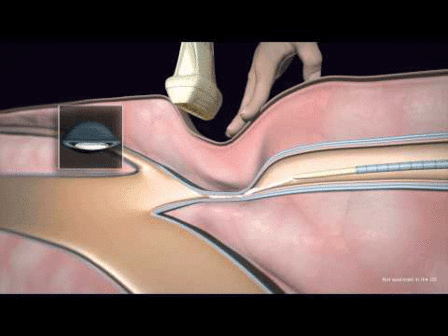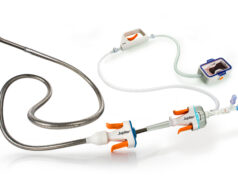
Covidien has announced the six-month results of the VeClose pivotal study, which demonstrated the safety and effectiveness of the VenaSeal closure system in patients with chronic venous insufficiency (CVI) having symptomatic reflux in the great saphenous vein. The results were presented at American College of Phlebology Annual Congress (ACP 2014; Phoenix, USA).
The VeClose randomised controlled non-inferiority study compared the safety and effectiveness of the VenaSeal system to that of the ClosureFast endovenous radiofrequency ablation catheter. Covidien’s ClosureFast catheter is an endovenous radiofrequency (RF) ablation catheter designed to collapse and close enlarged leg veins. The VenaSeal system, which is not approved and currently limited to investigational use in the United States, is a minimally invasive procedure that uses a specially formulated medical adhesive to close the great saphenous vein. Additionally, the VenaSeal system eliminates the need for surgery, thermal ablation and tumescent anaesthesia.
“The VenaSeal system is the latest innovation in the evolution of minimally invasive treatment options for chronic venous disorders,” says Nick Morrison, co-national principal investigator for the VeClose study. “The six-month results of the VeClose study showed high closure rates, comparable to radiofrequency ablation. I am excited about the possibility of offering this tumescent-free treatment option to patients.”
Two hundred and forty-two patients were enrolled in the trial, of which 108 were randomised to receive treatment with the VenaSeal system and 114 with the ClosureFast catheter. Twenty patients were enrolled as roll-in/training cases and treated with the VenaSeal system. The results showed outcomes for the VenaSeal system comparable with the excellent closure rates associated with the ClosureFast catheter and demonstrated non-inferiority of the VenaSeal system:
- At three months, the complete closure of the great saphenous veins achieved in more than 98.9% of patients treated with the VenaSeal system compared to 95.6% of patients treated with the ClosureFast catheter.
- The closure rate at six months was 98.9% and 94.3% for the VenaSeal system and the ClosureFast catheter, respectively.
- Additionally, there were no significant differences in patient reported pain during or at three days post procedure between the groups.
Additionally, in October 2014, the Journal of Vascular Surgery published results from the European Sapheon closure system observational prospective (eSCOPE) study, which demonstrated significant improvement in venous symptoms with a cumulative 12 month closure rate of 92.9%. The results also demonstrated the VenaSeal system improves patients’ quality of life.
The VenaSeal system is currently approved in Australia, Canada, Europe and Hong Kong, and more than 2,000 patients have been treated with the system. The VenaSeal closure system is not approved in the United States, and is currently limited to investigational use.










